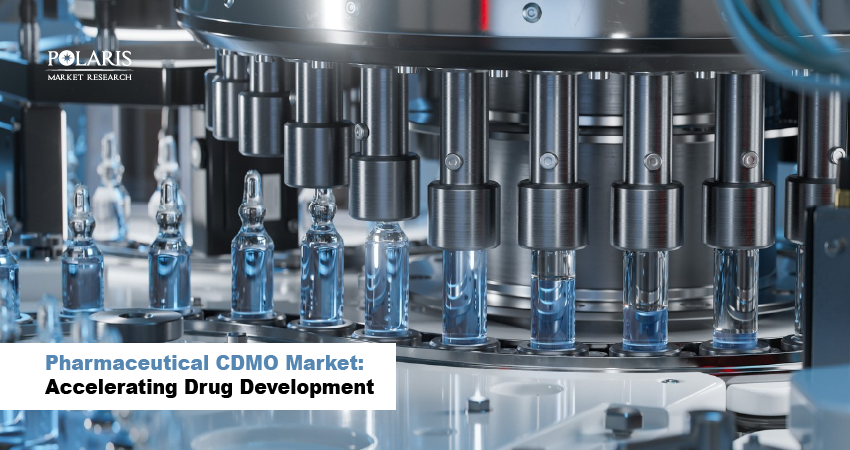Pharmaceutical CDMO Market: Accelerating Drug Development

The development and production of new drugs is an intense process. There are several steps involved, from preclinical research to the commercialization of drugs. Additionally, pharmaceutical companies need to meet the good manufacturing practice (cGMP) regulations mandated by regulatory authorities.
Pharma companies are increasingly turning to third-party vendors for developing and manufacturing drugs. But why is it so? And how do contract development & manufacturing organizations help bridge resource gaps and allow pharma companies to navigate industrial complexities? Keep reading as we explain all that you need to know about the pharmaceutical contract development & manufacturing organization market.
What Is a Contract Development and Manufacturing Organization?
A contract development and manufacturing organization (CDMO) is an organization that offers drug development and production services to pharma companies. These organizations help pharma companies bring new medicines to the market in a cost-effective and efficient way. A CDMO can be a one-stop solution for pharma firms. It can offer comprehensive services that range from drug development to production. The majority of pharma firms now rely on third-party vendors for manufacturing. This is done so that they can focus on their core competencies, which can include drug discovery and marketing. It’s worth noting that many full-service CDMOs are now a part of the drug discovery services market as well.
What’s the Role of CDMO in Drug Development and Manufacturing?
CDMOs can offer support to pharma companies at every step. This makes it possible for pharma companies to focus on their core skills. Also, they can outsource the sophisticated processes of drug development and manufacturing to experts.
During the early drug development stages, CDMOs can offer services like pre-formulation and formulation development. Pre-formulation studies the chemical and physical properties of the drug. This is needed to design formulations that are stable and effective. Formulation development involves the creation of the actual product. The development of the drug here can be in the form of capsules, tablets, or liquids.
After the development of the drug formulation, CDMOs can also help with stability studies. The studies are required to determine the shelf life of the product. They also help understand the impact of different environmental factors on the stability of the product.
During the clinical trial phase, the CDMO can offer clinical trial materials. These take the form of investigational medicinal products (IMP) that are given to patients during the trial. CDMOs also help with the required documentation to make sure that the regulatory requirements are met.
After receiving the approval for marketing, the CDMO can ramp up production to handle commercial-scale quantities. Packaging and distribution of the final drug product can also be taken care of by the CDMO.
What Are Major Market Metrics?
We’ve done an in-depth analysis of the rapidly evolving pharmaceutical contract development & manufacturing organization market. Our analysis reveals the market stood at USD 192.19 billion in 2024. It is projected to account for a CAGR of 8.11% between 2025 and 2034.
Pharmaceutical companies are increasing their spending on research and development to develop new therapeutics and enrich their product pipelines. This, in turn, is driving the growth of the market. The pharmaceutical contract development & manufacturing organization market is also benefiting from the rising prevalence of chronic conditions, which has created an increased demand for innovative medicines.
What Challenges Do CDMOs Help Pharma Companies Solve?
Accelerated Development: CDMOs can speed up the development stage by offering ready access to production capabilities. This reduces the time spent on the setup of facilities and validation.
Economies of Scale: The manufacturing facilities of CDMOs are often large-scale. This allows pharma companies to take advantage of the economies of scale and cost-effective manufacturing.
Quality and Regulatory Support: CDMOs know the regulatory requirements well. As such, they can help pharma companies in meeting the required compliance and quality standards.
Capacity Constraints: The internal manufacturing capacities of pharma companies may be limited. As such, they may not be able to manufacture products on a large scale. CDMOs can provide the required manufacturing capacity for meeting the demands of the market.
Risk Sharing: CDMO collaboration can help pharma companies share the risk associated with drug development and manufacturing. This is because the portfolios of CDMOs are often diverse, and they are also experienced with various projects.
Compliance Management: CDMOs can help with the management of costs related to compliance. They can do so by spreading the cost across multiple clients. This increases the affordability for individual pharma companies.
What Benefits Do CDMOs Offer in Pharma Development?
End-to-End Pharmaceutical Expertise
CDMOs provide access to additional expertise. They do so by making researchers with the required skills and experience available during every drug development and manufacturing stage. This helps pharma companies save on payroll costs.
Provided Equipment and Facilities
A wide range of equipment, including that from the steam autoclaves market, is needed to produce drugs in various forms. And the cost of the equipment is high. Collaborations with CDMOs reduce or take away the need for building and staffing pharma manufacturing units. The need to invest in expensive equipment is also reduced.
Ability to Scale Drug Projects
The inclusion of a new drug variation or changing manufacturing volume to meet increased demand can place a project at risk through failure to adhere to deadlines or ensure quality. The use of CDMO for supporting scale-up lowers the risk and shortens lead times.
Conclusion
The pharmaceutical contract development & manufacturing organization market has changed the way drugs are produced. CDMOs offer a wide range of services, such as regulatory support, product packaging, and clinical trials. The recent years have seen CDMOs also include clinical research services in their offerings. As development continues, increased investments are expected in biologics manufacturing and novel formulation technologies.

